Intel NUC5i5RYK Review: A Broadwell-U UCFF PC for Enthusiasts
by Ganesh T S on February 20, 2015 8:00 AM ESTNetworking and Storage Performance
We have recently started devoting a separate section to analyze the storage and networking credentials of the units under review. On the storage side, one option would be repetition of our strenuous SSD review tests on the drive(s) in the PC. Fortunately, to avoid that overkill, PCMark 8 has a storage bench where certain common workloads such as loading games and document processing are replayed on the target drive. Results are presented in two forms, one being a benchmark number and the other, a bandwidth figure. We ran the PCMark 8 storage bench on selected PCs and the results are presented below.
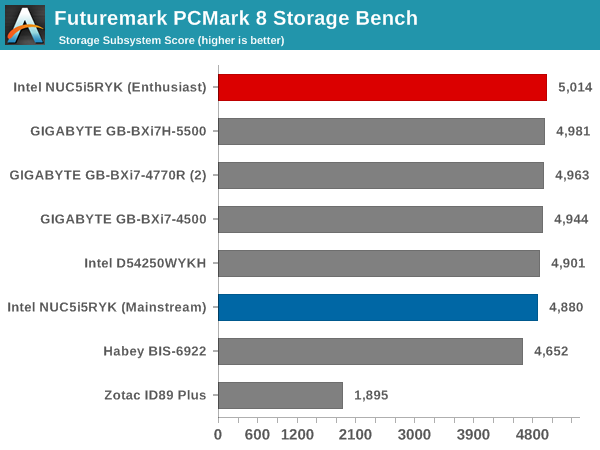
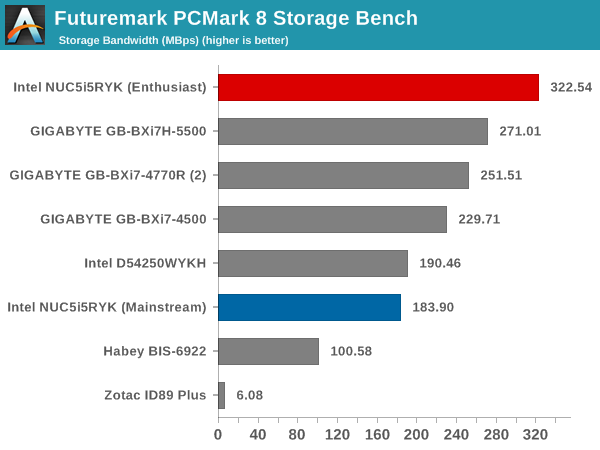
While the storage subsystem score doesn't bring out the efficacy of the M.2 PCIe SSD, the storage bandwidth number shows a chart-leading 322 MBps for the XP941 in the NUC5i5RYK. For good measure, we also ran the inbuilt benchmark in Samsung Magician (which doesn't support XP941 due to its OEM nature) to make sure that the SSD was utilizing the full capabilities offered by the PCIe lanes.
Sequential reads came in at 1 GBps and sequential writes at 716 MBps. Random accesses had upwards of 40K IOPS. All these point to the NUC5i5RYK possessing a ultra-compact platform with support for insanely fast primary storage media.
On the networking side, we restricted ourselves to the evaluation of the WLAN component. Our standard test router is the Netgear R7000 Nighthawk configured with both 2.4 GHz and 5 GHz networks. The router is placed approximately 20 ft. away, separated by a drywall (as in a typical US building). A wired client (Zotac ID89-Plus) is connected to the R7000 and serves as one endpoint for iPerf evaluation. The PC under test is made to connect to either the 5 GHz (preferred) or 2.4 GHz SSID and iPerf tests are conducted for both TCP and UDP transfers. It is ensured that the PC under test is the only wireless client for the Netgear R7000. We evaluate total throughput for up to 32 simultaneous TCP connections using iPerf and present the highest number in the graph below.
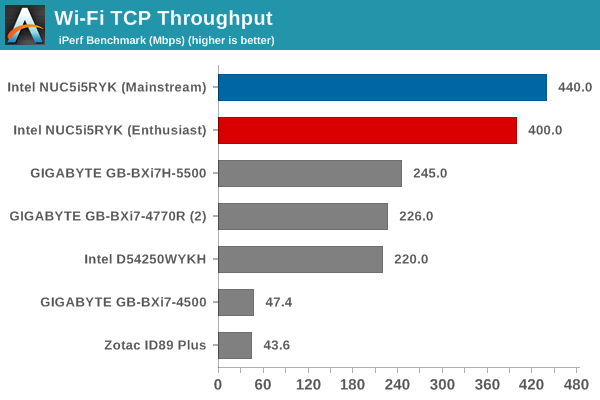
In the UDP case, we try to transfer data at the highest rate possible for which we get less than 1% packet loss.
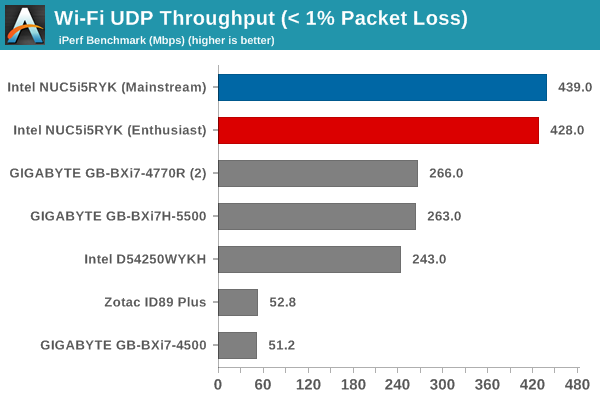
Intel's AC7265 now behaves like a true 2x2 solution compared to the AC7260 in our testbed. While the numbers are not as good as those obtained with Broadcom-based 802.11ac WLAN cards, the improved performance is quite welcome.


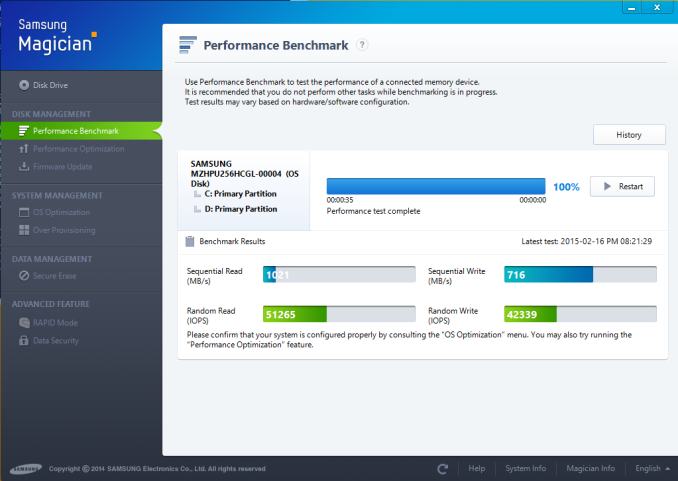








83 Comments
View All Comments
smegforbrain - Saturday, February 21, 2015 - link
Agreed. We initially bought a D34010WYKH1 (i3) at work as a test device last summer to see how well they worked. A couple of our employees have been using them for more than 6 months now.I ended up buying a D54250WYKH1 (i5) for myself to use at home as a media PC and other uses. I'm very happy with it, but I am slightly disappointed that they didn't go with full HDMI for the Broadwell refresh.
mavere - Friday, February 20, 2015 - link
VP9 hybrid acceleration is enabled in recent Intel Broadwell drivers, and apparently Chrome 41+ (currently in Beta) has the ability to hook into Intel's VP9 decoder.In future Broadwell tests, can you check Youtube power consumption with Chrome 41+? Chrome defaults to VP9 on so most Youtube videos nowadays, so this is an important and unexplored area for mobile power usage.
TrackSmart - Friday, February 20, 2015 - link
I don't much of a performance difference between the "mainstream" and the "enthusiast" versions used in this article (aside for artificial SSD benchmarks). Of course, the price difference between the configurations is only $66.Really the biggest performance difference among all of the candidates is between the one machine that has a spinning hard disk and all of the rest. Worth knowing none-the-less.
Essence_of_War - Friday, February 20, 2015 - link
Should I be getting the message that intel not want us to use thunderbolt?Jaybus - Saturday, February 21, 2015 - link
No. It is a matter of power. Thunderbolt standard specifies that every port supply 10 W of DC power. Also, the controller itself is very high bandwidth and requires > 2 W. It adds up on a system striving to be low power and fanless.Samus - Friday, February 20, 2015 - link
Wow Intel has the cleanest uefi bios interface I've ever seen. Shame they don't make motherboards anymore :(A4i - Saturday, February 21, 2015 - link
I got the old i5-4200U , mounted on industrial PC chassis (half inch thick aluminum side panel/radiator). It gets extremely hot, when operating at max CPU load (and ~0 GPU load). Don't hold you breath for power efficiency and productivity. Also that platform lacks any overclocking settings in BIOS or OS tools and is frustratingly painful to undervolt.KAlmquist - Saturday, February 21, 2015 - link
A benchmark question:The "enthusiast" version has 10-10-10-32 1866Mhz memory, while the "mainstream" version has 9-9-9-27 1600Mhz memory. So the difference in memory could account for at most a 17% difference in performance between the two versions (1866Mhz/1600Mhz). But the Cinebench R15 3D rendering multi-threaded benchmark shows the "enthusiast" version to be 34% faster, and the 7-Zip LZMA Decompression benchmark makes the "enthusiast" version 30% faster.
The only other difference between the two versions is the choice of SSD. This could in principle explain the differences listed above, but that would mean that the two benchmarks cited are largely disk I/O bound since we see the effect even with relatively fast disk drives (SSD rather than mechanical) and a relatively slow CPU (1.6 Ghz dual core). I thought those benchmarks were intended to measure computational throughput, and thus should not be affected by the storage subsystem at all. Am I wrong?
Kidster3001 - Friday, February 27, 2015 - link
If you're looking for a pur CPU benchmark that doesn't rely on other parts of teh system then you'll end up with synthetics that everyone complains about because they don't reflect the real world.Yes, Archive applications rely very heavily on I/O. If you want to use them for CPU benchmarks you should set up RAM Disks for the storage.
On a similar note, one of my pet peeves is using browser benchmarks to compare CPUs. Browser benchmarks measure the performance of the browser and it''s engine(s). They do very little good as a CPU comparison tool. Sunspider for instance can score wildly different on the exact same system just by using a different browser.
gfieldew - Saturday, February 21, 2015 - link
Could the FHD model drive a 4K TV/Monitor adequately? I'm not expecting HDMI 2.0 but 60Hz would be good. Thank-you!